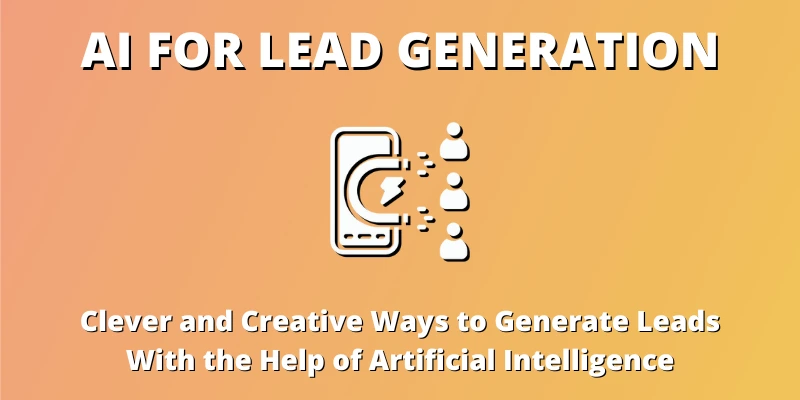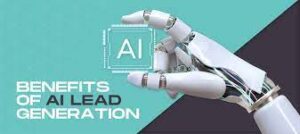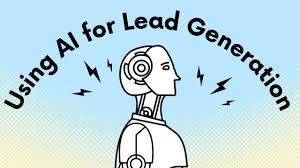How to Use AI Lead Generation Software: 5 Best Practices

Most businesses across the world are extensively using AI lead generation software for various purposes. Artificial intelligence lead generation has become a powerful tool for businesses to expand their customer base. The advancements in AI and machine learning have given rise to sophisticated lead-generation tools that can generate high-quality leads at a faster rate compared to traditional methods.
Let us guide you through the top ten strategies for using AI in lead generation and demonstrate how this trend is transforming the lives of marketers. We will provide a comprehensive overview of the most effective tactics for leveraging AI for lead generation in this post
How does the lead generation process work?
Before we move on to our topic of how to use AI lead generation, let’s understand that lead generation is often misunderstood by marketers, who mistakenly associate it with direct sales. In reality, its purpose is to attract and capture qualified leads that have the potential to be converted into customers at later stages of the sales pipeline. In essence, lead generation is just one component of the broader sales process.
Lead generation strategies encompass various methods to attract potential prospects and convert them into qualified leads. Effective channels for generating leads include a company’s website, social media platforms, and advertising campaigns.
The online lead generation process typically involves the following components:
- Lead Capture: To retain information about site visitors, it is crucial to capture their contact details, particularly email addresses, through lead generation landing pages.
- Lead Magnets: Bridge the gap between website traffic and leads by offering valuable information or resources in exchange for visitors’ contact information.
- Lead Qualification: Assess and analyze the gathered lead information to gauge their potential for making a purchase.
- Lead Segmentation: Categorize qualified leads based on their personas and level of engagement or involvement.
Although the lead generation process generally consists of the same components, the strategies employed can vary across different business verticals. Therefore, marketers must develop customized strategies that are tailored to their specific niche and target audience.
AI for lead generation has become increasingly prevalent among marketers; however, only a limited number of marketers possess the knowledge and expertise to effectively harness the full potential of AI in lead generation.
The basics of artificial intelligence lead generation
To effectively use AI lead generation, it is essential to comprehend the underlying technologies and tools that support AI-powered processes. This includes machine learning algorithms, natural language processing, and predictive analytics. These technologies collaborate to analyze extensive datasets, detect patterns, and predict the conversion potential of leads. By grasping the fundamentals of AI in lead generation, businesses can enhance their understanding of how AI can be applied to optimize lead generation strategies, leading to improved outcomes and more successful lead generation campaigns.
The benefits of AI lead generation

AI for lead generation offers businesses the opportunity to streamline processes, improve lead quality, personalize customer interactions, gain predictive insights, reduce costs, and achieve scalable growth. Some of the key benefits of AI lead generation include:
- Increased efficiency: AI automates manual tasks, saving time and allowing businesses to focus on high-value activities.
- Improved lead quality: AI analyzes data to identify promising leads, increasing the likelihood of conversion.
- Better targeting: AI provides deep insights into the target audience, enabling tailored marketing and sales efforts.
- More personalized interactions: AI-powered lead nurturing offers personalized interactions based on previous behavior, strengthening relationships.
- Increased ROI: AI-generated high-quality leads and personalized interactions lead to a higher return on investment.
- Cost-effectiveness: AI-powered tools can also help businesses allocate their marketing budgets more efficiently by focusing on the most promising leads.
How to Use AI for Lead Generation

AI lead generation can effectively identify and target prospects who are likely to be interested in a business’s products or services. It can also qualify leads, create personalized messages, and more. This accuracy in targeting and nurturing leads can significantly improve lead quality, boost conversion rates, and save time and resources in sales outreach efforts. Despite these benefits, businesses often face challenges in the lead nurturing stage of the lead generation process. They may include:
- Hiring the right salespeople who can effectively connect with the target audience
- Collecting accurate data for analysis and decision-making
- Steering the dialogue to convert prospects into customers
AI lead generation is a valuable solution for supporting sales and marketing goals by streamlining the complex processes involved in capturing, nurturing, qualifying, and closing deals. AI lead generation also leverages data-driven insights to accurately target prospective leads who are likely to be interested in your products or services. This ensures that your outreach efforts are directed toward the right audience, increasing the effectiveness of your lead-generation campaigns. Here’s how AI excels in these areas:
- Effective omnichannel management: AI lead generation manages multiple channels, such as email, social media, and websites, ensuring consistent messaging, improved engagement, and a unified customer experience across various touchpoints.
- Saving time and resources: AI automates traditional lead sourcing, reducing the resource-intensive nature of the process and allowing staff to focus on more valuable projects.
- Sales team support: AI lead generation software increases productivity by consistently providing the team with high-potential leads.
- Marketing improvement: AI automates time-consuming marketing tasks such as lead segmentation, CRM management, email campaigns, and lead scoring. This frees up your team to focus on strategic planning, creative content, human-to-human negotiations, and proposal issuance.
AI assigns lead scoring based on factors such as the lead’s position in the sales funnel, actions taken, and contact information collected. This enables businesses to prioritize high-potential leads for focused attention and conversion efforts.
Here are some methods to integrate AI into your sales and marketing strategies:
- Market identification: AI can analyze data to spot trends and patterns and predict market changes to help discover and target audiences.
- Content creation: offer content creation ideas, spot content trends, generate SEO-optimized articles, and develop a scheduling calendar.
- Lead magnets: AI uses data insights to personalize customer lead magnets to increase appeal and relevance.
- Lead segmentation: AI tools can segment leads based on demographics like location, income, age, and buying behaviors for personalized targeting.
- Lead qualification: AI chatbots can ask qualifying questions to assess prospects, create customer profiles, and determine their viability for further advancement in the sales process.
- Lead nurturing: AI algorithms can automate and deliver personalized messages and recommend relevant products and services for lead nurturing.
- Performance analysis: AI lead generation tools can measure how well a campaign is performing and offer suggestions for improvement.
As a business owner, integrating AI lead generation tools can enhance and streamline your sales processes. AI can discover and rank qualified leads, automate outreach and personalization, handle large amounts of customer data, provide accurate customer support, and offer data-driven insights to optimize outreach campaigns and deliver relevant content to leads.
(4) Innovative Ways to Use AI for Lead Generation + Examples

1. Personalized Content Recommendations
Personalization with AI involves using artificial intelligence to analyze your preferences, behaviors, and interactions to deliver customized information and content that aligns with your specific interests.
When you visit a website, AI algorithms track your clicks, searches, and actions to understand your preferences. Using this data, the AI system can suggest relevant content such as articles, videos, products, or events that align with your interests and provide value to you.
The goal is to provide you with a highly personalized experience, presenting information that aligns with your interests and keeps you engaged.
You can attract and maintain the interest of potential leads by tailoring information to their individual preferences and interests.
- When you deliver content that aligns with your leads’ interests and needs, they are more likely to engage with it.
- By providing content that directly addresses your leads’ pain points or interests, you create a stronger connection and build trust.
- By presenting relevant content effortlessly, you save your leads time and effort searching for what they need.
- Data from personalized content allows you to better understand your audience, effectively segment them, and refine your marketing strategies for better lead generation results.
Examples of AI lead generation
Netflix uses AI algorithms to analyze your viewing history, ratings, and interactions, enabling personalized content recommendations that align with your preferences.
Amazon‘s AI algorithms analyze your data to provide personalized product recommendations, helping you discover new products that align with your interests.
2. Intelligent Chatbots for Lead Qualification
Chatbots are AI lead generation tools that can engage in dynamic conversations similar to human agents, thanks to natural language processing and machine learning algorithms. They can initiate discussions, ask qualifying questions, and assist visitors in the lead qualification process. Key advantages of chatbots include handling multiple conversations simultaneously, providing 24/7 availability, ensuring a streamlined user experience, delivering quick responses, and maintaining consistent messaging. Moreover, chatbots can collect essential contact information such as names, email addresses, and phone numbers, reducing the workload for your team.
Examples of AI lead generation
Drift, a conversational marketing platform, provides an AI chatbot called “Drift Chatbot” that engages with website visitors, qualifies leads, and captures contact information.
You can use AI lead generation software to analyze extensive datasets and predict the likelihood of a lead converting into a customer. This powerful technology enables you to prioritize your efforts and allocate resources effectively to leads with the highest conversion potential.
3. Predictive Lead Scoring
Predictive lead scoring empowers you to streamline your lead generation process and enhance conversion rates by focusing on the most promising leads. This approach optimizes resource management and increases the efficiency of your overall sales and marketing efforts.
It enables companies to focus on high-potential leads, leading to improved productivity, higher conversion rates, and ultimately, greater business success.
- AI analyzes data and patterns to assign scores to leads, enabling you to prioritize your time and resources on the most qualified prospects.
- With a deeper understanding of each lead’s needs and preferences through AI insights, you can deliver personalized messaging and offers, increasing the chances of converting them into paying customers.
- Predictive lead scoring unifies the understanding of lead quality between sales and marketing teams, fostering collaboration and alignment in their strategies.
- Instead of investing time in leads with low conversion potential, you can allocate your efforts towards leads with higher potential, optimizing your resource utilization.
- By focusing on qualified prospects, AI-driven lead scoring enhances conversion rates, maximizing the effectiveness of your sales and marketing efforts.
Examples: AI lead generation
Salesforce provides “Einstein Lead Scoring,” an AI-powered predictive lead scoring feature. It enables sales teams to concentrate their efforts on high-scoring prospects, prioritize their focus, and increase deal closure rates.
Marketo Predictive Scoring utilizes analysis to enable marketing teams to identify prospects with a high likelihood of conversion. This empowers them to create personalized and targeted campaigns, resulting in improved engagement and conversion rates.
4. Automated Email Campaigns
By leveraging this strategy, you can create automated email campaigns tailored to your prospects based on triggers or actions. Whether it’s welcoming new subscribers, nurturing leads through the sales funnel, or re-engaging with inactive contacts, these powerful AI tools, when combined with top cold email platforms, enable you to effectively nurture leads, foster stronger connections, and achieve successful lead generation outcomes.
- AI analyzes individual lead data, such as preferences, browsing behavior, and purchase history, to dynamically generate personalized content and recommendations for each recipient.
- AI considers metrics like open rates, click-through rates, and engagement data to identify the best times to send emails, ensuring maximum impact and avoiding email fatigue.
- AI automates the process of segmenting leads based on various attributes and behaviors, identifying patterns and similarities to group them into segments aligned with marketing goals.
- AI lead generation software can trigger email campaigns based on specific lead behaviors or actions. For instance, if a lead abandons a shopping cart, AI can automatically send a follow-up email with a personalized offer to encourage purchase completion.
- AI-powered email campaigns enable personalization at scale, saving time and effort while delivering tailored content to a large number of leads.
Examples: AI lead generation
Airbnb Uses targeted automated email campaigns to engage customers and drive bookings by providing timely and relevant information that keeps users interested and encourages them to make reservations.
Similarly, Spotify’s automated email marketing is personalized to each user’s listening habits and preferences. They send personalized playlists, music suggestions, and new release information based on the genres and artists that users enjoy, enhancing their music experience.
How can you use AI for B2B lead generation?
B2B lead generation involves identifying and nurturing potential customers for your business. AI can significantly enhance and expedite each stage of the B2B lead generation process. By leveraging the right talent and AI technologies, your B2B lead generation efforts can scale effectively. A contemporary B2B lead generation team may allocate roles and responsibilities as follows.
8 Effective AI Lead Generation Tools for High-Quality Leads
AI lead generation tools can rapidly scrape vast amounts of data, providing valuable insights and information about leads in minutes, a task that would take hours or even days to accomplish manually.
1. Seamless.AI
Seamless.AI is a leading AI lead generation software and business leads platform. It offers a range of features and solutions to help sales teams and marketing professionals maximize their effectiveness and generate more revenue. With Seamless.AI, users can connect directly with their ideal customers, deliver personalized messages at the right time, and build accurate leads lists.
The platform provides data enrichment services to ensure the information is up-to-date and offers automation capabilities to streamline list-building efforts. Seamless.AI integrates with popular CRM and engagement platforms, allowing seamless integration into existing workflows. With its advanced search engine and AI-powered tools, Seamless.AI empowers businesses to prospect efficiently and achieve their sales goals.
Pricing of this AI Lead generation
Seamless.AI offers basic, pro, and enterprise plans, but pricing details are not available on the website. You need to contact the sales team for specific price quotes.
2. CoPilot AI
CoPilot AI is a platform that focuses on content optimization and leads outreach on LinkedIn. It helps businesses create engaging content to attract potential customers. The platform offers personalized AI insights to customize content for better search engine visibility. It also supports video prospecting, allowing teams to generate and deliver AI-powered video messages in bulk.
By leveraging machine learning (ML), AI for lead generation can analyze past interactions with individual leads and predict their preferences for specific products or services. This enables marketers to tailor their focus on the offerings that are most likely to resonate with these leads. Additionally, having insights into leads’ preferences eliminates the guesswork for the sales staff and reduces the risk of losing leads due to ineffective marketing communication.
CoPilot AI utilizes sentiment analysis to identify high-intent leads and predict conversion likelihood. It can be integrated into content creation workflows, providing content ideas, social media posts, and language translation capabilities.
Pricing of this AI Lead generation
- Standard plan for $389 per month
- Scale plan for $488 per month
- Teams plan for $999 per month
- Check the website for substantial deductions for yearly prepayment
3. Kartra
Kartra is an AI-powered market automation tool that helps businesses attract customers through websites and social media platforms. It enables sales teams to engage in lead nurturing and build relationships using email campaigns. With Kartra, you can automate tasks, personalize user experiences, and dynamically respond to website visitors based on their actions.
The platform streamlines lead generation efforts by tracking potential customers and understanding their behavior, habits, and preferences. This information allows you to tailor marketing messages to attract high-quality leads. Kartra supports lead tagging and scoring, enabling you to segment and quantify leads to determine where to focus your efforts.
Pricing of this AI Lead generation
- Starter plan for $119 per month
- Silver plan for $229 per month
- Platinum for $549 per month
- Check the website for substantial deductions for yearly prepayment
